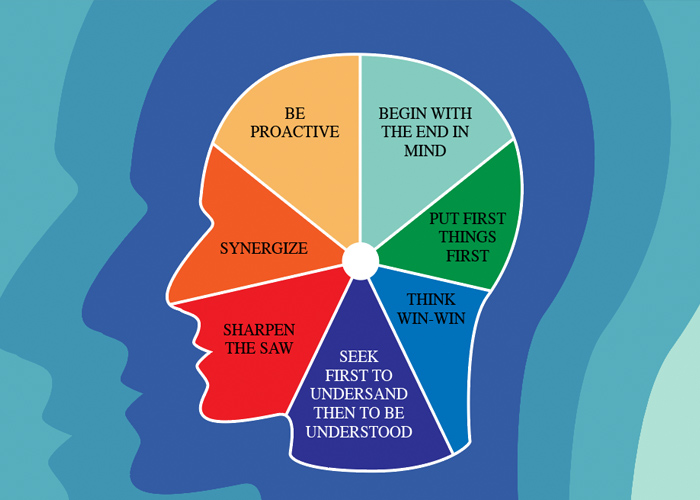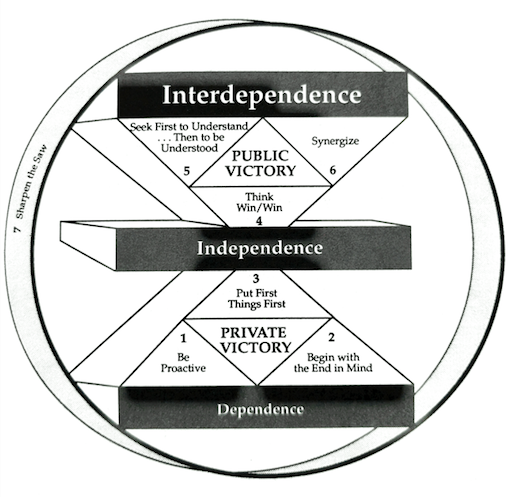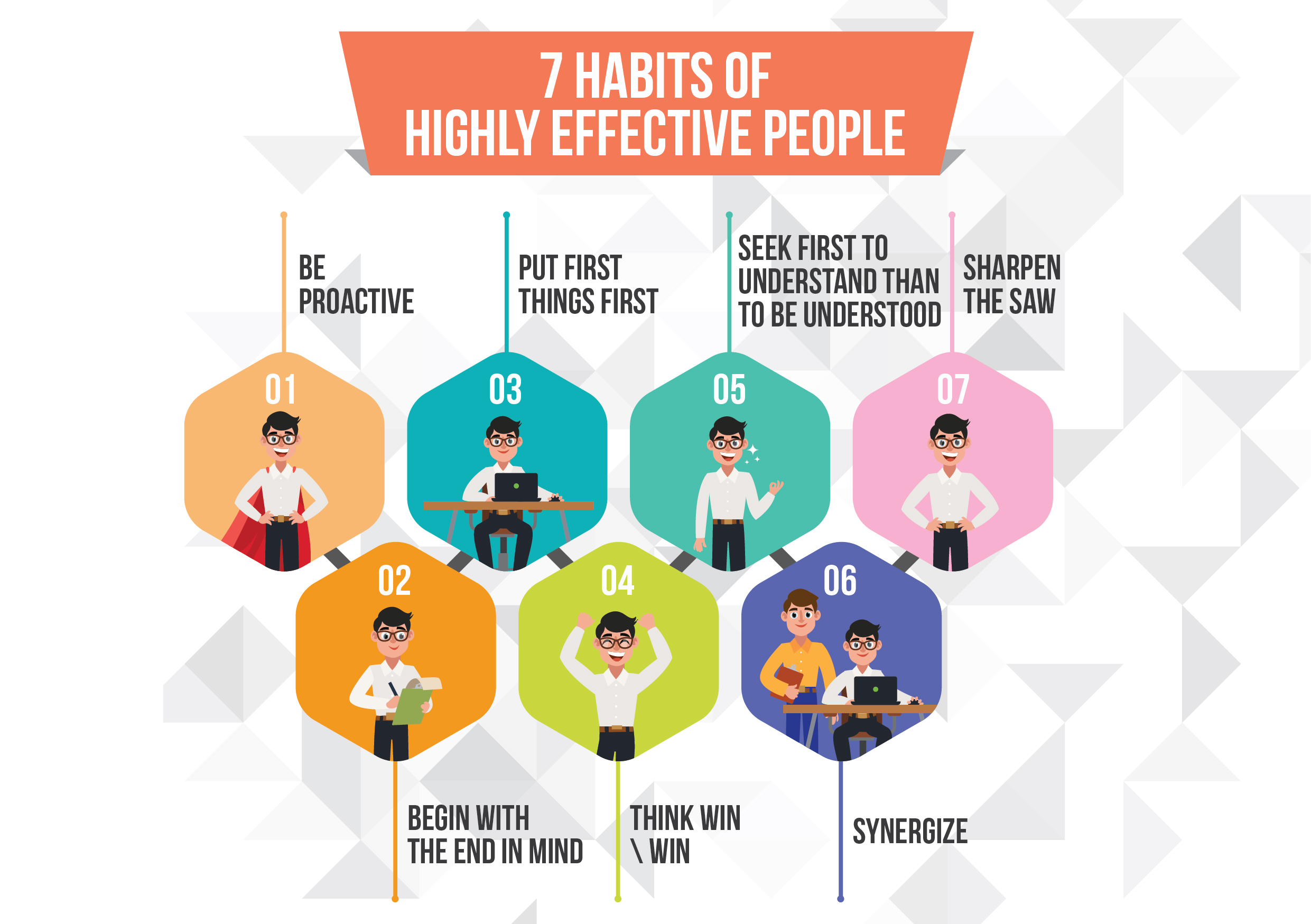The Seven Habits of Highly Effective People
2023-03-14
16:23:00

Before we start, I just want to point out that this is not my book or philosophy, I am simply summarizing and explaining Stephen R Covey’s book. The reason I have chosen to share this book with you is because if you apply these habits in your life as a student, you will be happy and successful.

Habit 1: Be Proactive
Simply defined being proactive is taking responsibility for whatever happens to you. Proactive people are people who take full responsibility for whatever happens in their life. Imagine two people from the same class write a test and encounter a question that they were never taught and as a result they fail the test. The proactive person will say, “I failed the test because I didn’t study hard enough, the next time I will work much harder.”
Because of this difference, one will be better prepared and will pass the next time and the other will remain in the complaining situation if not worse. Do exactly what you plan on doing, if your plan requires you to have no friends then cut off your friends; if it requires you to stop watching TV, then stop watching TV at least until you have succeeded at your goal.
There are two circles about how we respond; there’s the circle of concern and the circle of influence. Reactive people focus on the circle of concern while proactive people focus on the circle of influence. The circle of concern contains things that concern us, things like the economy, the news, the government, inflation, what people think about us, etc. Reactive people pay so much attention to those things as a result they end up frustrated and they start to think they have enough time and energy for important things in their lives.
Even their language is reactive; they blame the person. They say things like it’s his fault, she did this to me, they are going to laugh, he disturbed me etc. They use victim language like, it’s his fault , I must, it’s impossible etc. The reactive person will say things like, “I didn’t fail the test, the teacher never taught that topic.” Now the difference between the responses also as a source; you know the saying, “Everything comes from something except God.” The reactive person was conditioned to be like that, it could be from parents, friends or any other external sources. Whenever they made a mistake they were told that it wasn’t their fault and as a result they grew up as irresponsible people.
Habit 2: Begin with the end in mind
This habit is focused on planning and goal setting. What do you want to get in the end? Write down your goal on a piece of paper right now. Write everything, the grade you want to get such as a distinction or an A+, then think about what is going to required to get your goal. It can be quitting watching series, stopping hanging out with friends or studying for 2 hours + per day.
Then write down the plan, it has been scientifically proven that writing down a goal makes you 90% better than a person who just says it. So that’s habit 2, plan.
Habit 3: Put first things first
Habit 2 was about planning, now this habit is about taking action. Planning is only 20% of success the remaining 80% is about taking action. Most people have great plans and great goals but they have no action; because of this most people end up blaming others and complaining that success is only for the talented (Reactive tone).
Habit 4: Think win-win
Thinking win-win is more about cooperation than competition. It’s about the perception of let’s work together to get this goal rather than I will leave you behind because I am better than you are, choose your results and forget anything else.
This is perhaps the most difficult habit to apply, from childhood we have been conditioned to always want to be at the top and as a result we compete. This habit requires you to be mature. Think win-win is the habit that makes you think about the other person. How would you feel if your friend got a 90% when you got a 75%? Most people will respond with feeling bad or judging themselves according to that percentage.

Habit 5: Seek first to understand then to be understood
Most people find that they are misunderstood in most cases because they never really consider the other person’s point of view. In simpler and more common words, most people don’t put themselves in other people’s shoes.
Most students end up envious and full of hatred because they don’t understand when their friends say they are busy. They want their friends to available when they want them to. The selfish perception, wanting things to happen when they want them to happen, not considering that the other person just like themselves has a goal and plan only leads them to more stress and frustration.
Habit 6: Synergize
Put in simple terms, synergy is working together. It’s considering the fact that two heads are better than one (Cooperation). In order for someone to be faster and better, they just need to work with others. You need different ideas to come up with that one great idea.
As a student, this rule applies to creating a study group. In order to create a successful study group, ensure that your group does not exceed 10, the only way for the eleventh person to join is if one member leaves. Also ensure that your study group has serious people not just smart people. Make sure your group has active participators not spectators. In other words, make sure that everyone in the group participates and contributes something. Every person must teach or explain at least 2 topics.
Habit 7: Sharpen the saw
To sharpen the saw is to rest. After working so hard, rest, take a break, relax, listen to music, get fresh air. Sharpening the saw is not an option, it’s a necessity. After studying, relax, let time pass, be bree, play around and get wild.
The scientific reason behind this is that your brain becomes better, sharper and more active after relaxing. Remember to sharpen the saw.
In conclusion, make sure you apply all these habits in order to become better. Take responsibility, plan, take action, cooperate, understand others, work with others and relax. The day is yours to take.

◼ Posted by: Micheal Mubanga
◼ Position: CEO

